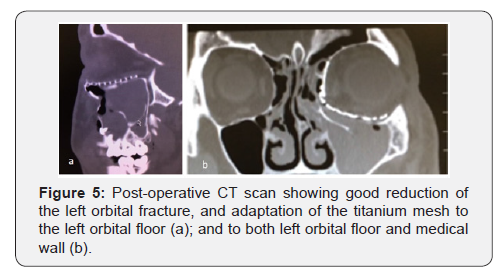The prognosis of patients was predicted by ct evaluation.
Diplopia after lower orbital floor repair.
Ial postoperative complication the incidence of diplopia after surgical repair of orbital blowout fractures has not been well studied.
Both of them could be weakened by direct trauma 12 17 ischemia so called compartment syndrome 18 and iatrogenic damage during reconstructive surgery 6 13 or restricted by adhesions 19 fibrosis 10 or entrapment under improperly.
A minimum of 6 months follow up was available for all patients included in the study.
All patients referred during a 2 year period because of persistent diplopia after surgical repair of orbital fracture were categorized according to the degree and pattern of ocular motility.
We retrospectively studied 54 patients who underwent repair of an orbital blowout fracture.
A minimum of 6 months follow up was available for all patients included in the study.
Once improvement stops a decision for surgical repair is appropriate.
Patients who have tenting or deformity of eom on ct scan are more likely to have postoperative diplopia.
16 the inferior rectus muscle and the inferior oblique muscle may be involved.
Diplopia in patients with orbital floor fractures may appear in either up or downgaze or both 9 14 the etiology of this phenomenon has been speculated on since lerman s 1970 study.
A total of 47 of 54 86.
Although diplopia is often an indication for surgery and is presented to patients as a potential postoperative complication the incidence of diplopia after surgical repair of orbital blowout fractures has not been well studied.
We retrospectively studied 54 patients who underwent repair of an orbital blowout fracture.
In this retrospective study of 58 patients 36 eyes repaired within 14 days mean of 9 days were compared with 22 eyes repaired at up to 29 days mean of 19 days.
A total of 47 of 54 86 patients had clinically significant diplopia.
Complication the incidence of diplopia after surgical repair of orbital blowout fractures has not been well studied.
A minimum of 6 months follow up was available for all patients included in the study.
We retrospectively studied 54 patients who underwent repair of an orbital blowout fracture.
An association of preoperative diplopia as well as radiologic evidence of extraocular muscle eom swelling and diplopia 6 months after repair of pure blow out fractures with variousalloplastic.
If the diplopia doesn t resolve and it interferes with the patient s daily activities then surgery is warranted a frequently cited study by dal canto and linberg 2 demonstrated that patients fared equally well if their orbital floor fractures were repaired within 14 days or within 29 days after trauma.

